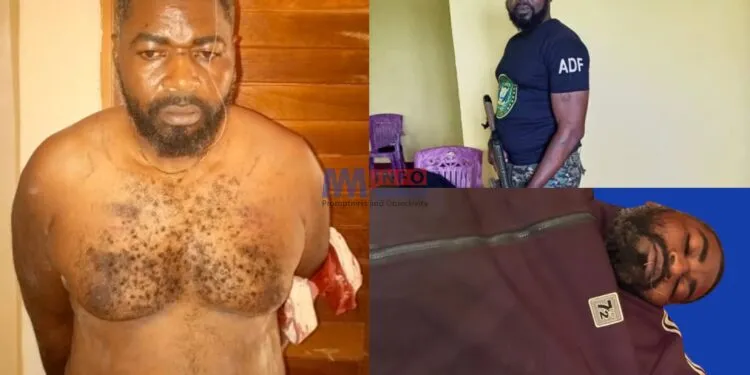We recently reported the alleged elimination of self-styled “General JC,” a commander of the Ambazonia Defence Forces (ADF), by Cameroonian security forces. The report was based on images of him which we saw lying in a pool of blood. These were backed by confirmation statements from some security sources. However, upon closer examination, the whole report of his death comes under intense scrutiny. Initial information claimed that he was tracked down and killed at the Lira Hotel in Bamenda. However, fresh evidence suggests a far more complex and possibly manipulated reality.
Contradictory Evidence and Testimonies
Security sources reported that General JC, whose real name is Funwi Christopher, died in an operation at the Lira Hotel. It is also aleged the hotel served as a safe haven for separatist fighters and a hub for a lucrative kidnapping-for-ransom scheme. Independent investigations by Mimi Mefo Info (MMI) uncovered inconsistencies in this narrative.
One widely circulated image shows JC lying in what appears to be a pool of blood. However, closer examination reveals no visible wounds on his upper body, and there is no apparent connection between his body and the bloodstain on the sheet beneath him. Another similar image shows him with his eyes open, his right hand raised against a wall—again with no signs of injuries.
Perhaps the most damning piece of evidence is an image of JC alive, shirtless, and standing upright with his hands handcuffed behind his back. His only visible injury is a bandage wrapped around his left hand, stained with blood. This suggests that he received some form of medical attention before the alleged execution.
Former ADF Defence Chief-turned-peace advocate, Capo Daniel, further fuelled suspicions. In a YouTube video he states that JC was actually in the custody of Cameroon’s elite Rapid Intervention Battalion (BIR). “JC is alive and being held by the security forces,” he claimed.
A History of Betrayal and Atrocity
General JC’s past makes his fate even more significant. He once served as a trusted bodyguard to Ni John Fru Ndi, the late chairman of the Social Democratic Front (SDF). However, he later turned against his mentor and became implicated in multiple abductions targeting him. He also links his name to the July 2023 Nacho Junction massacre, where gunmen under his command allegedly slaughtered at least ten civilians.
Furthermore, there are claims that he was the ADF hitman who abducted and killed the SDF Senator, Barrister Kemende Henry. Capo Daniel had again made revelations that the senator was killed by the ADF on orders of Ayaba Cho Lucas.
‘General JC’ links to a reign of terror in Bamenda. For insteace there is the case of the abduction and killing of a man in Old Town shortly after his wedding, followed by the collection of ransom for the release of the kidnapped wife. He faces accusations of enforcing the controversial taxi-colour change policy, leading to the burning of many cars.
His reported death marked a significant victory against separatist violence, given the controversial history surrounding him. The emerging contradictions have prompted calls for greater transparency.
Extrajudicial Killings and the Danger of Silent Executions
If JC is indeed in detention rather than dead, serious concerns arise about his fate. Cameroon has been repeatedly accused of extrajudicial executions. There are numerous cases of political detainees disappearing or turning up dead under suspicious circumstances.
Recent cases, such as the disappearance of Cameroonian activist Steve Akam after his arrest and the brutal killing of journalist Samuel Wazizi, highlight the risks faced by individuals in state custody. Human Rights Watch has reported on the growing repression of free speech and opposition voices in Cameroon, particularly as the country nears its 2025 elections.
An anonymous security analyst noted, “In this conflict, the fate of detainees often remains sealed behind closed doors, with many facing torture or extrajudicial killings without any accountability.” If JC remains alive in custody, there is a real danger that he could face a similar fate.
Was His Death Staged?
A theory gaining traction suggests that JC’s death may have been staged to stop him from revealing sensitive information. Some sources allege that he had ties to influential figures who may have benefitted from the separatist conflict. As such his capture posed a threat to them. If JC were to testify in a public trial, he could expose critical details about financial backers and hidden networks. Also he would expose the internal betrayals within the separatist movement.
As one investigative source speculated, “If JC is holding information that could expose powerful networks, a staged death might be a convenient way to neutralise his influence without stirring public unrest.”
They also highlight that the Cameroon military has a history of publicly displaying the corpses of notorious separatist ‘generals.’ Recent examples include the case of Oliver Lekeake, known as ‘Field Marshal. When he was killed, his corpse was publicly displayed in Kumba. Efang, known as ‘General Big Number,’ was taken from a hospital and killed in detention. Authorities discarded his corpse in a public space at the Guzang Market.
However, in JC’s case, aside from the images captured at the hotel featuring a supposed corpse, which does not appear in a video recorded shortly after, no information exists regarding the corpse’s location.
The Urgent Need for Transparency
For the victims of General JC’s actions and the broader community suffering under the ongoing crisis, the truth remains a fundamental right. “The families affected by his actions deserve transparency,” a local human rights advocate told MMI. “The state must clarify exactly what happened to General JC,. Whether he is alive, and if so, under what conditions he is being held.”
The ambiguity surrounding his fate only deepens the distrust between the population and state authorities. Questions about extrajudicial practices and the potential for staged narratives will continue to haunt Cameroon’s Anglophone crisis . This is until there is a transparent process of information sharing by the state.



